COVER STORY SIDEBAR
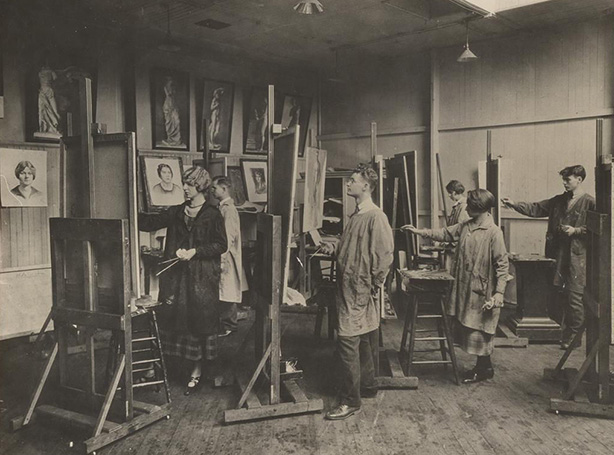
Archival photo of an early art class at Cornell. Photo: Division of Rare and Manuscript Collections.
A few of Cornell's most popular classes, past and presentIn the 1950s, Cornell students, including Ruth Bader Ginsburg '54, flocked to hear Vladimir Nabokov's lectures on Austen, Tolstoy and Chekhov. Ginsburg says she still thinks about the novelist's instruction on "changing the way word order should go" every time she writes an opinion as an associate justice of the U.S. Supreme Court. |
Even more students, however, took professor Harold Thompson's American Folk Literature course, known around campus as "Romp-n-Stomp." Peter Yarrow '59 took the class and would go on to become a member of the famed folk trio Peter, Paul and Mary (which was originally called "The Ivy League Three"). The raucous lecture/sing-alongs presented by Thompson shaped Yarrow's career as a musician and folk hits with Peter, Paul and Mary such as "Blowin' in the Wind" and "If I Had a Hammer" that are now woven into American history.
Which world-changing figure will emerge from one of Cornell's current auditorium-packing courses decades from now with a story to tell?
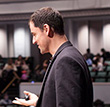
David Pizarro. See larger image
PSYCH 1101: Introduction to Psychology
Cornell's largest course for years, Intro to Psych draws more than 800 students to the only classroom that will accommodate them – Bailey Hall – for lectures on curiosity-piquing subjects such as laughter, memory and sex. "There is no lack of interesting topics," says associate professor David Pizarro, who aims to equip students with scientific tools and to instill in them "a sense of awe about the human mind."
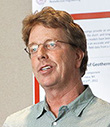
Bruce Monger. See larger image
SEA 3660: Introduction to Oceanography
Bruce Monger of Earth and Atmospheric Sciences draws more than 900 students by teaching with enthusiasm, running a tight ship and making it fun. "I play great (and loud) music before class that is themed to the lecture topic of the day," says Monger. Incorporating various sciences – biology, chemistry, physics and geology – the course draws students from all over the university for a deep and wide look at the ocean.
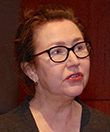
Cindy Hazan. Photo: Joe Wilensky. See larger image
HD 3620: Human Bonding
Love, sex and relationships are never far from the average college student's mind, and associate professor Cindy Hazan emphasizes the importance of human bonds in her course. She caps the course at 600 so it will fit into the Kennedy Hall classroom where she can "see every student's face."
"This is serious stuff," she says. Human Bonding, with no prerequisites, attracts students from all colleges. One engineering student summed the course up best when he said: "It's great to be getting credit for thinking about the things I'm thinking about all the time anyway."
PLPA 2010: Magical Mushrooms, Mischievous Molds
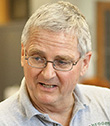
George Hudler. See larger image
Eight years after taking professor George Hudler's popular course on fungus, a Cornell alumnus working in an emergency room sent a frantic email to the plant pathologist: quick! Was this mushroom, consumed by a patient, poisonous?
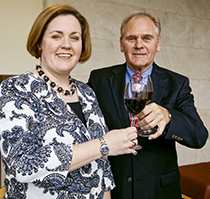
Lecturer Cheryl Stanley '00, who currently teaches the Introduction to Wines course, with professor Stephen Mutkoski '67, Ph.D. '76, who taught it for more than 30 years. Photo: Jon Reis Photography. See larger image
Hudler hears from former students at least once a month with similar fungus-related questions. More than 450 students per semester remember this course for the "gee whiz" moments Hudler, now retired, placed in each lecture to open students' eyes to the world: "I chose mold and fungi and mushrooms as my platform for that."
HADN 4300: Introduction to Wines
What's in the little black cases hundreds of students tote all over campus one afternoon each week? Wine glasses. And where are they going? To Statler Hall for Introduction to Wines, a class on the pleasures of wine and the history behind the labels. With more than 700 enrolling each term, more than 41,000 Cornell students have taken the course since it was introduced in 1972 by professor Vance Christian. Stephen Mutkoski '67, Ph.D. '76, the Banfi Vintners Professor of Wine Education and Management, took over teaching the course in 1983; and lecturer Cheryl Stanley '00, who was a TA for the class as a student, now teaches the course.
Cornellians on coursesENG 2800: Creative Writing "It gives me an outlet that's different from the biology and chemistry classes I take for my major." – Sam Baxter '16, biology major in Arts and Sciences "Reading this latest book ['The Fourth Dimension of a Poem'] by Professor Emeritus M.H. Abrams took me right back to my freshman year at Cornell, when I sat in his lectures simply enchanted by everything, from their lyric intellectual thought to the very tone of them. I recall his voice as though I had heard it just yesterday." – Kathy Hymes '80 "My favorite class so far has been EDUC 2610: The Intergroup Dialogue Project. It's unlike any class taught at Cornell; it's visceral, reflective, but most of all a place for self-growth and community building. As a facilitator, I had the rare experience of virtually teaching my peers about social justice issues, but also learned a lot myself from the role and working together with my students to create more awareness on campus." – Kevin Milian '16
"In [CS 2110: Object-Oriented Programming and Data Structures] I enjoyed the subject matter. It helped my dissertation. The teaching was phenomenal. I'd definitely recommend it to anyone who does quantitative work. The good teaching comes from enthusiasm for the material, enthusiasm for working with students [and] well-designed lectures." – Evan Buntrock, Ph.D. candidate in the field of economics "I was a part of the first global health curriculum course. It was an awesome microcosm of the Cornell mantra of responding to the needs and ever-changing interests of Cornell students. The new curriculum is evidence that Cornell respects and values the interests of students as it is now a major concentration for incoming students." – Nicole Ramsey, Weill Cornell Medical College "In [PMA 6540: Introduction to Film Analysis with professor Don Frederickson], the professor was very passionate and intelligent. The course was eye-opening, with a high level of discussion on themes such as psychological time lapse. It has been informing my practice ever since." – Calvin Kim '15, fine arts/psychology major "Firing 20-gauge shotguns at clays [in Trap and Skeet Shooting with instructor Mark Sacco] is something I would have never done if it weren't for the opportunity to do so here at Cornell." – Kathryn Perkins '15, School of Hotel Administration "While I have taken several amazing classes at Cornell – and it is hard to pick just one – I would say one of my favorites was the introductory course for urban and regional studies majors, CRP 1100: The American City. The course introduced us to how cities have developed and what forces make cities what they are today. It was one of the most informative classes I have taken, and one I always looked forward to, even though it was at 9:05 a.m." – Caroline Flax '15 "Greek Mythology [CLASS 2604] with professor [Dave] Mankin was my favorite, mainly because he's weird. He refused to take his sunglasses off all semester, made derisive comments about the administration during class and accepted written questions in a Casper the Friendly Ghost bucket at the front of the room, all of which he answered except questions asking why he refused to take off his sunglasses." – Audrey Menna '15 "[Assistant professor Huiju Park in FSAD 6900: Understanding Functional Aspects of Clothing and Design] was such an enthusiastic brand-new teacher who really covered all my favorite material on understanding thermal comfort and performance aspects of clothing. We also had a great class project with local firefighters." – N. Elizabeth Allen, graduate student, Human Ecology "In [PAM 2350: The U.S. Health Care System], we learned about all aspects of the health care system, including health insurance, right as the Affordable Health Care Act was going through. I was able to explain it to my parents." – Julie Apuzzo '15, biology and society major, College of Agriculture and Life Sciences "The common thread in each class [Field Biology with Charlie Smith, Evolution with Will Provine and Normative Ethics with Dick Baer] was a fantastic professor. Both Dick Baer and Will Provine pushed the limits of conventional thinking in the classroom. Charlie Smith was an incredibly talented individual; he was like a brilliant Teddy Roosevelt mixed with Henry Thoreau." – Tom Daniel, master's degree student in the field of natural resources |